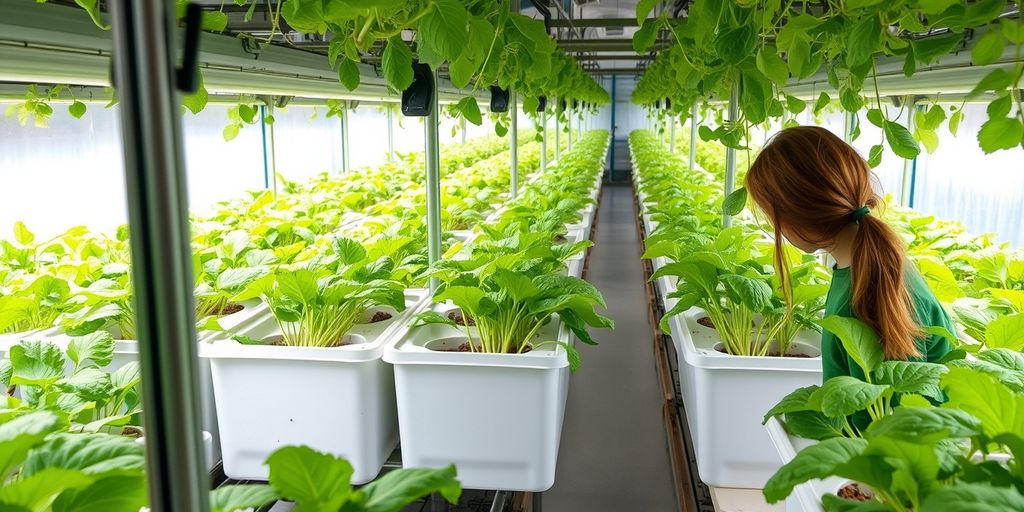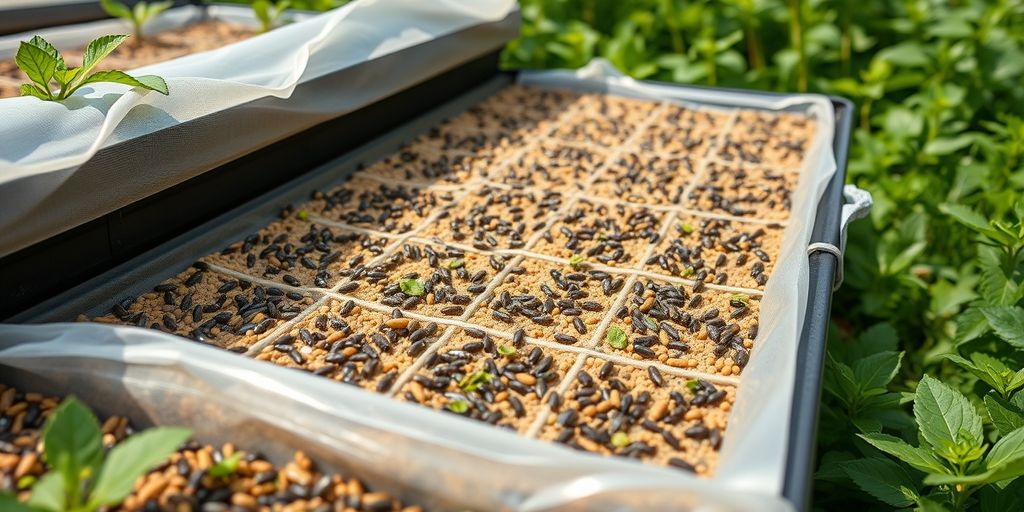Explore innovative BSFL farming techniques for sustainable agriculture, optimizing practices, and environmental benefits.

Black Soldier Fly Larvae (BSFL) farming is emerging as a game-changer in sustainable agriculture. With the global population expected to exceed 9.7 billion by 2050, traditional farming methods are struggling to keep up. BSFL farming offers a promising solution by converting organic waste into valuable products like protein feed and organic fertilizer. This article explores innovative BSFL farming techniques that can help secure our food future while protecting the environment.
Choosing the right substrate is crucial for BSFL farming. The substrate should be rich in organic matter to support larval growth. Optimizing substrate moisture content is essential, as it affects the larvae's ability to feed and grow. Pre-treating the substrate can also help in breaking down complex materials, making nutrients more accessible to the larvae.
Maintaining the right environmental conditions is key to successful BSFL farming. Temperature, humidity, and light all play significant roles. The ideal temperature range for BSFL is between 77°F and 95°F. Humidity should be kept high, around 60-70%, to prevent the substrate from drying out. Proper ventilation is also necessary to avoid the buildup of harmful gases.
Quality and safety are paramount in BSFL farming. Regular monitoring of the substrate and larvae can help in identifying any issues early. It's important to ensure that the substrate is free from contaminants that could harm the larvae or the end products. Following safety standards and guidelines will help in gaining consumer trust and expanding the market potential of BSFL products.

BSFL frass is becoming popular as an organic fertilizer. It has shown results similar to commercial fertilizers in boosting crop yields. The frass is made by feeding BSFL different substrates like food waste, manure, and brewery spent grains. Studies have shown a significant increase in NPK concentrations and a reduction in heavy metals to safe levels. BSFL frass can help reduce global warming since it needs less CO2 than commercial fertilizers.
BSFL frass can also be used to improve soil health. It enhances soil structure, increases water retention, and promotes beneficial microbial activity. This makes it a valuable addition to sustainable farming practices. Farmers can use BSFL frass to enrich their soil and boost crop productivity.
BSFL frass is also being explored as a growing medium for soilless agriculture, like hydroponics and aquaponics. Its nutrient-rich composition makes it an excellent alternative to traditional growing media. Using BSFL frass in soilless systems can lead to healthier plants and higher yields, making it a promising option for urban farming and other innovative agricultural practices.

BSFL farming offers a promising solution to tackle global food security and environmental issues. With the world's population expected to exceed 9.7 billion by 2050, traditional farming methods are becoming less sustainable. BSFL farming can produce valuable goods with minimal environmental impact, making it an eco-friendly choice for waste management. By converting organic waste into useful products, BSFL farming helps reduce pollution in both urban and rural areas.
BSFL can also help lower carbon emissions. When BSFL are harvested and preserved, they temporarily store carbon that would otherwise be released into the air. Agriculture is a major source of greenhouse gases, contributing up to 12,000 million tons of CO2 equivalent each year. By turning food waste into edible proteins and oils, BSFL can reduce the need for primary agricultural production, thus lowering greenhouse gas emissions.
BSFL are increasingly used to recycle organic waste into high-quality protein feed and organic fertilizer. This sustainable practice supports a circular economy by turning waste into valuable resources. The dry larvae contain about 42-49% crude proteins, 38% lipids, and other nutrients, making them a great option for animal feed. The frass, or waste, from BSFL farming is also gaining popularity as an organic fertilizer, benefiting farmers who already use BSFL for animal feed.
BSFL farming has made great strides in bioconversion techniques. New methods are being developed to make the process of turning organic waste into useful products more efficient. These improvements not only boost the yield but also ensure the quality of the final products. Researchers are working on optimizing the conditions that BSFL need to thrive, such as temperature, humidity, and the makeup of the substrate.
Automation is key to scaling up BSFL farming. Automated systems for feeding, harvesting, and processing larvae are being put in place to cut labor costs and increase productivity. Biotechnology is also being used to improve the nutritional value of BSFL. Techniques like genetic modifications and selective breeding are being explored to enhance the protein and fat content of the larvae.
Future research in BSFL farming aims to tackle several important areas. One main focus is on creating sustainable and cost-effective farming practices. Researchers are also looking into new uses for BSFL, such as in biofuel production and pharmaceuticals. Collaboration between schools, businesses, and the government is essential to drive innovation and bring these advancements to market.
The more we understand and optimize the farm's production conditions, the more likely we are to adopt BSFL as a mainstream solution for sustainable agriculture.

Ensuring the safety of BSFL products is crucial for gaining regulatory approval. BSFL bioconversion still faces challenges in meeting safety standards. To mitigate risks, it is recommended to use cleaner waste streams, such as spent grains and pre-consumer vegetable matter, when producing BSFL for human consumption. Additional validation studies are needed to fully understand the safety aspects of rearing BSFL on various waste streams.
Consumer acceptance is vital for the success of BSFL products. People are more willing to consume insect-fed animals than to directly eat insects. The perception of safety plays a key role in this acceptance. Educating consumers about the nutritional benefits and environmental impact of BSFL can help in gaining their trust. Developing appealing culinary options and raising awareness about the positive aspects of BSFL can also promote acceptance.
The demand for sustainable products is growing, and BSFL (Black Soldier Fly Larvae) products are no exception. BSFL have gained significant attention as ingredients for poultry feed to improve value chain circularity and sustainability. Their high nutrient content, including 42-49% crude proteins and 38% lipids, makes them a valuable resource. Additionally, BSFL frass, a by-product, is becoming popular as an organic fertilizer.
Farmers can benefit economically from BSFL farming. By using BSFL as a low-cost alternative protein source, farmers can reduce their dependence on expensive animal or fish feed. This is especially beneficial for smallholder farmers who can substitute costly feed with BSFL, thus lowering their production costs. Moreover, the production and sale of BSFL frass as an organic fertilizer can provide an additional revenue stream.
While the market potential for BSFL products is promising, there are challenges to be addressed. Ensuring the safety and quality of BSFL products is crucial for gaining consumer trust. Additionally, the scalability of BSFL farming practices and compliance with local and international regulations are essential for market expansion. However, the opportunities are vast, with the potential for BSFL products to be used in various industries, including animal feed, pet food, and organic fertilizers.
The development of BSFL products offers a unique opportunity to promote a circular economy by recycling organic waste into high-quality protein feed and organic fertilizer.
In summary, the market potential and economic viability of BSFL products are significant, with opportunities for growth in various sectors. By addressing the challenges and leveraging the strengths of BSFL, the industry can achieve sustainable and profitable outcomes.
In conclusion, Black Soldier Fly Larvae (BSFL) farming offers a promising and sustainable solution to some of the most pressing challenges in agriculture today. As the global population continues to grow, traditional farming methods are becoming less viable. BSFL farming provides an eco-friendly way to manage waste and produce valuable products like protein feed and organic fertilizer. By converting organic waste into useful resources, BSFL can help meet the increasing demand for food while minimizing environmental impact. However, to fully realize the potential of BSFL farming, it is essential to optimize farming practices, ensure product quality and safety, and gain consumer trust. With continued research, investment, and collaboration, BSFL farming can play a crucial role in promoting sustainable agriculture and securing our food future.
BSFL farming involves raising Black Soldier Fly Larvae to convert organic waste into valuable products like protein feed and fertilizer.
BSFL farming is sustainable because it uses organic waste as feed, reducing landfill waste and producing valuable products with minimal environmental impact.
In agriculture, BSFL can be used to produce organic fertilizers, improve soil health, and serve as growing media for soilless farming systems like hydroponics.
BSFL help in waste management by consuming organic waste, which reduces the amount of waste sent to landfills and lowers pollution levels.
Farmers can save on feed costs by using BSFL as a low-cost protein source and can also earn extra income by selling BSFL frass as organic fertilizer.
Challenges include ensuring the safety and quality of BSFL products, scaling up farming practices, and meeting regulatory standards to gain consumer trust.